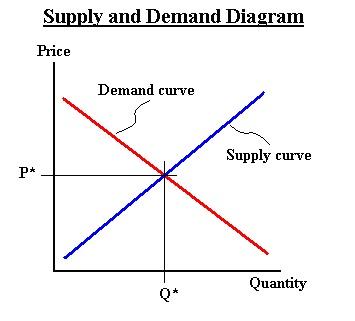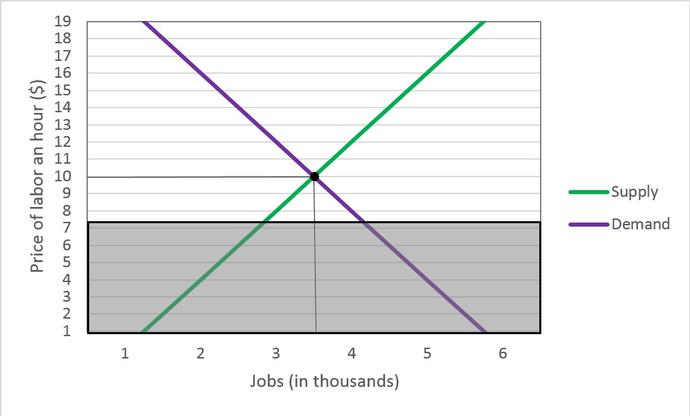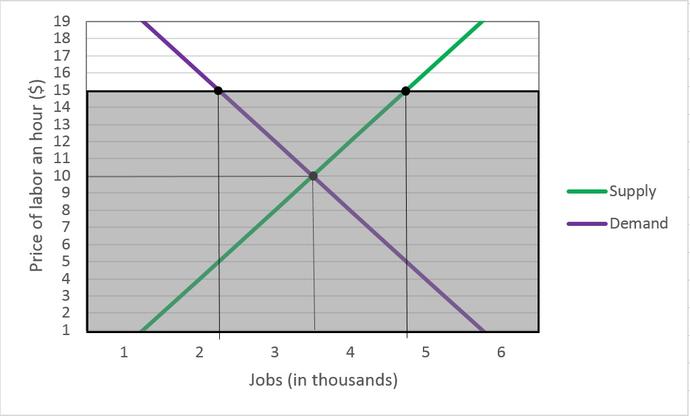There's been much talk about raising the minimum wage recently. Some people think the minimum wage needs to be raised, a lot, to $15. Some think it only needs to be raised a little, to around $9 an hour instead. Some think minimum wage just doesn’t need to raised at all. Well, I’m here to talk about why raising the minimum wage to $15 in particular would not help the poverty situation and destroy jobs. I’ll explain this using two of the most basic, fundamental laws of economics: The law of supply and the law of demand.

Supply & Demand basics:
Supply is a general term for the “sellers” of a good. The law of supply says that as the price for a good moves up, sellers are willing to provide a larger quantity of a good for that price. If the price of a good were to move down, sellers instead will only provide a smaller quantity of a good for that price. The supply curve has a direct relationship with price, meaning as price goes up, so does supply.
Demand is a general term for the “buyers” of a good. The law of demand says that as the price for a good moves up, buyers are only willing to provide a smaller quantity of a good for that price. If the price of a good moves down, buyers are willing to buy a larger quantity of a good for that price. The demand curve has an inverse relationship with price, meaning as price goes up, demand goes down.
Both of these laws follow a ceteris paribus condition, meaning “all things remaining constant”. This means there are no outside influences, like consumer tastes changing or the costs of production going up, causing the price to change. Think of it like bartering, “How much will you sell me for $3? Well how much for $5?”
Now that we have those concepts straight, there’s three more things we need to know about in order to read a graph of Supply vs Demand properly. Equilibrium, shortage, and surplus:
Equilibrium is where the supply and demand curves intersect. The Equilibrium price is the price at which equilibrium is achieved, and is known as the “market clearing” price. This is because at this price, the quantity demanded and supplied equal each other, as in there is no shortage or surplus in demand or supply. Equilibrium is the state that all markets in an economy want to achieve so everyone is happy. When there isn’t equilibrium in supply and demand, however, there is either a shortage or surplus in supply and demand instead. Equilibrium price is shown as P*, and equilibrium quantity is shown as Q*.
To find whether a market is in surplus or shortage, draw a horizontal line along the equilibrium price. Anything above that line is known as a “surplus”, and anything below it is known as a “shortage”. In a market surplus, there are buyers left over who want to buy the good but aren’t willing to pay that much for the good. There are also sellers who have unbought goods left over, since they can’t sell them since people won’t buy it at this price. In a market shortage, there are buyers who want to and would buy the good, but there’s not enough goods for them to buy. The sellers will stop short of production because they won’t produce enough goods to satisfy the market at that price. Shortages and surpluses are what both the buyers and sellers want to avoid, leading them to equilibrium.
How this applies to minimum wage:
In order to demonstrate how this applies to minimum wage, let's treat human labor as the "good" to be bought or sold. Then we'll evaluate the quantity of human labor jobs there are available in an example city vs the price of that labor. Assume that these are all minimum skilled jobs, meaning there are the fewest and least difficult requirements to do the jobs. The supply curve will be the human workforce that supply their labor for jobs at a certain price, and the demand curve will be the business that demand human labor and will give jobs at a certain price.

In this particular city, the equilibrium price of labor is $10 an hour and the amount of jobs is 3.5k. That means all the people who will work for $10 an hour and the jobs businesses will have for $10 an hour are equal. All jobs are taken, everyone is satisfied. Notice the black box though, this represents minimum wage at $7.25 an hour. All jobs must be either at this price level or above, none can be in the shaded region below.
The equilibrium labor price isn't that unrealistic, if you think $10 an hour for minimum skilled labor would never. In my city, most of the minimum skilled jobs are at $8 an hour, with some variation between $7.25 and $8.50 around. There is no law saying employers should pay $8 an hour, there is no public request for $8 an hour jobs, it's that employers saw they could get more jobs they needed filled if they offered $8 an hour rather than $7.25, like some of the competition was offering. Some of my high school friends and I actually left our first jobs at this one restaurant we were working at because they paid $7.25 an hour while the one right down the road was offering $8 an hour + tip outs. Funny enough, the lower wage restaurant went down under a week later due to other reasons. However, it still stands that you can find a job easy for $8 an hour in my town, all of my buddies work $8+ an hour jobs. I actually have a $12 an hour job at 18 and it required nothing more than having good character and the strength/skill to move furniture properly.
So, if we were to raise the minimum wage to $9 an hour, almost nothing would change for this particular city. Sure, some of the cheap $7.25 jobs sprinkled about would have to raise up, but overall since most labor is working for $10 an hour, there was no effect.
What happens if we raise the minimum wage to $15 an hour, though?

The graph changes dramatically. Now, there are ~4.75k people who want a job and will take it at $15 an hour, a 1.25k increase over $10 an hour. However, businesses now only want to give 2.25k jobs for $15 an hour, a 1.25k decrease under $10 an hour. Not only are there less jobs available now, ~35% less, there's now about ~35% more people who want a job but can't get one. There is a surplus, a surplus of labor waiting to be utilized and a surplus of jobs that business aren't "selling" anymore.
What does this mean in the real world? Well, ~35% of the jobs wouldn't just magically disappear at first. Shifts and job would still needed to be filled, only the "expendable" labor would get fired immediately, aka people who aren't good at their jobs, people hired just to fill in occasional gaps, etc. They'll most likely get the boot first. However, for everyone else the storm isn't over. There won't be much tolerance anymore for inefficiency. Everyone is going to have to work much harder and with more precision since now management is going to make sure they're getting the most out of their labor. In addition, now hours will be cut and shifts will be inflexible. Before the raise, there were maybe 2 guys working the expo in the kitchen at the restaurant. Now there might only be one a shift instead, or maybe during the slower times of customer activity a day the guys are let go early and told to come back later when things start getting busy again. Either way, there's going to be job and hour cuts, and that will suck for the workforce. For the more skilled workforce that was already making $15 an hour, now they're pissed because the guy who takes dirty dishes from tables to the kitchen is making as much as they are. They'll feel cheated, and will probably be angry, will demand a raise, and might even quit working.
This is only the short-term impact though. The long-term impact means that human labor for many jobs will either no longer be required or greatly reduced. The whole, "Robots will soon arrive to take your job", threat is real and it's been happening for decades, now it will reach an all time high. Soon baristas, servers, and pizza delivery men will be obsolete. This is because it will be much cheaper (and probably more accurate) to replace human labor with robots in the long-term. Robots only run on a couple dollars of electricity a day once the initial costs are paid. They don't need a salary and they don't need breaks. They only need occasional maintenance and maybe someone else to overlook them. For businesses who can't afford the robots nor the labor force...well, I guess it's survival of fittest. Let's also not forget that the prices of everything else will rise once minimum wages rose, as they did the past 4 times we've bumped up minimum wage since the 1990's. So now everyone is paying more for what they used to. It's why food, medical care, and housing has gone up in price while robot manufactured goods like TV's, computers, and cars have gone down in price (when adjusted for inflation).
So that's that. A few benefitted while the majority suffered. Oh, and the youth especially suffered, since they take up a large portion of minimum skilled jobs. Want some over summer money to help buy food and pay for textbooks Johnny? Well too bad, there aren't any jobs out there for you...
Counter-arguments against raising minimum wage to $15 an hour:
(1.) Argument: Minimum wage is supposed to be a living wage. You can't live off of the current wage, you need to raise wages to meet the cost of living. It was like that back in FDR's time.
Counter-argument: Even if minimum wage was meant to be a living wage, it isn't that way anymore. Our economy has turned into a skilled economy, many jobs require some level of higher education and pay more than enough for a living wage, too. The only minimum wage jobs you'll find are unskilled ones that require only basic high school education or less. Even then, what defines a "living wage"? It's different for everywhere in the country. So I could get by with $8 an hour in some rural town, but not in NYC where I might need $14 an hour.. That's why raising the whole national minimum wage isn't smart, it doesn't have an equal effect everywhere. Raising the wage should be a city or state matter. Not only that, but a single college student who just works for some food and books doesn't require that much to "live", they have no other bills. However, a 40 year old mother of 3 who needs expensive pain medications for her back needs a lot for her to "live". Who do we base a "living" wage off of? Is it the absolute bare necessities for "bare" people, or necessities and then some for people who need more? The living wage argument doesn't work due to ambiguity in applying it.
(2.) Argument: It's the right thing to do. Walmart is making billions a year in profit while their employees get paid so little. It's only fair they get a slice too, and the way to do that is to raise wages.
Counter-argument: Not every business in America is Walmart or McDonalds. There are many, many small businesses scattered around who maybe make a couple hundred thousand dollars or a couple million in profit at most. There's many restaurants and family owned services in the US that have small profits. Restaurants have many minimum wage or close to minimum wage workers. Suddenly doubling the cost of their labor might leave them negative profits or none at all. So they'll have to let go of workers, or if they can't lose their workforce without major consequences, just close down entirely. That hurts everyone: The workers, the owners, the local/state/national economies. We want more businesses in the US up an running, that makes things better for everyone. The point of a business is to make a profit, no profits = no business.
(3.) Argument: Jobs and hours will not be cut, and prices will not go up for goods. We can protect the workers from being replaced with machines.
Counter-argument: No you can't protect them. Unions already tried for decades to stop some industries from becoming robot and machine ran. Some powerful unions in the auto-industry even couldn't stop it. It's because the right of a business to choose their workforce can't be taken from them, whether it's right or wrong. If a business decides it's cheaper to run with robots, they're allowed to do it, just as they're allowed to fire a worker for not being a productive employee. Jobs will certainly be cut just like they were during the recession in 2008-09. If a business can't afford its labor, it can let it go. It would be unfair or everyone to force them to keep workers if it would wind up driving the business into the ground. 5 workers being let go is better than all 40. Labor sometimes makes up more than half the business costs of some labor intensive industries. Lastly, if the business can't let their labor go for whatever reason, prices will go up. They want to make a profit, and suddenly taking a chunk out of that profit won't fly. They'll raise prices of their products to compensate.
(4.) Argument: You can't support a family on minimum wage. There's many older adults with kids working minimum wage jobs who can't afford to pay their bills. Not raising it just let's them suffer.
Counter-argument: Why on Earth would you have kids if you can't afford them and are working such a low paying job? That's why people go to college and work their way up the corporate ladder, so that they can afford bills and a family. The teens that work minimum wage jobs don't have those same bills or kids, so they can get by just fine. Forcing a raise on wages just because a small group of people failed to try in life and get a higher paying job and/or had sex without weighing the consequences or using protection doesn't make sense. They made their choices, they deal with the fallout of them. Even then, some of the waitresses at the restaurant I work at are single moms and they make ends meets just fine. Of course, these were the waitresses who chose not to spend their money on alcohol and cigarrettes like 90% of the girls there.
To close, I'd also like to say that minimum wages are more of a guideline than a necessity for a well functioning labor force and economy. Like I said with my city, most jobs are already above the minimum wage without any need to be. Markets help decide what the labor costs will be, if the competition offers more pay for it's workers, employees will leave. My cousin saw this happen last month. Burger King started paying $11 an hour for entry positions and advertised it, while the Wendy's across the road was still paying $9. It wasn't long before some Wendy's workers changed workplaces and Wendy's raised its wages to $11.
Thank you for reading! Post any comments. criticisms, questions, and death threats below!
 Holidays
Holidays  Girl's Behavior
Girl's Behavior  Guy's Behavior
Guy's Behavior  Flirting
Flirting  Dating
Dating  Relationships
Relationships  Fashion & Beauty
Fashion & Beauty  Health & Fitness
Health & Fitness  Marriage & Weddings
Marriage & Weddings  Shopping & Gifts
Shopping & Gifts  Technology & Internet
Technology & Internet  Break Up & Divorce
Break Up & Divorce  Education & Career
Education & Career  Entertainment & Arts
Entertainment & Arts  Family & Friends
Family & Friends  Food & Beverage
Food & Beverage  Hobbies & Leisure
Hobbies & Leisure  Other
Other  Religion & Spirituality
Religion & Spirituality  Society & Politics
Society & Politics  Sports
Sports  Travel
Travel  Trending & News
Trending & News
Most Helpful Opinions